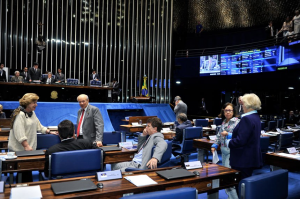Plenary approves project that strengthens fight against piracy

The Senate approved on Tuesday (9) the bill that alters the rules to combat crimes of copyright infringement (commonly called piracy). O PLC 63 / 2012 it gives more power to the judge responsible for the process, facilitates the seizure of counterfeit goods and prevents the return of pirated products to the market.
The approved text was the replacement of the rapporteur, the former senator Vital do Rêgo. He will still need to go through an additional round of discussion and voting. Then, as there were changes during the Senate process, he will return to the Chamber of Deputies.
The project is an initiative of the National Council to Combat Piracy and Crimes against Intellectual Property (CNCP), linked to the Ministry of Justice, and aims to expand copyright protection and accelerate the punishment of those responsible for the production and sale of products pirated.
According to the text, when the seized asset is not considered of public interest by the National Treasury, the judge has a duty to determine its destruction and not just the possibility of taking such an attitude, as provided for in the Criminal Procedure Code (Decree Law 3.689 / 1941).
Currently, only the author whose rights have been harmed can request the destruction of the pirated material, but the project opens that possibility up to the police authority and the Public Ministry.
According to the rapporteur, ex-senator Vital do Rêgo, as in the case of seized drugs, the project opens the possibility of the early destruction of equipment, instruments, productions or reproductions that violate copyright. The rapporteur says he considers that, having done the due examination, there is no reason to keep the deposit of the seizure, if there is no challenge as to its lawfulness.
Vital presented a substitute, with suggestions to the proposal. He noted that the market for pirated products has a strong relationship with organized crime - "gangs that commit very serious crimes such as drug trafficking and people for sexual exploitation".
Batch description
Among the changes approved by the Senate is the provision that the description of the seized counterfeit goods will be in batches and not individually and in full, as determined by the law in force today. The expertise can also be carried out by sampling the seized goods. Vital do Rêgo proposed that the use of apprehension and expertise in batches be made only when dealing with large quantities of seized goods.
The bill also establishes that the arrest warrant is signed by only two witnesses, eliminating the possibility of further signatures, as stated in the current legislation.
Faithful depositary
In the case of seized goods, the project proposes that the victim of the crime be the faithful depositary, that is, the individual designated by the Justice to watch over an asset during the process. In the Senate, the text was changed so that the victim is the loyal depositary preferably. According to Vital do Rêgo, this imposition can often generate more economic costs for the copyright holder and cause greater losses than those generated by the crime itself.
Vital also suggested that the judge may authorize the use of assets seized by public educational and research institutions during the course of the process.
The approved text also prohibits the defendant himself from becoming the faithful depositary of the seizure. Another change in the substitute approved by the Senate is the permission to pre-sell the seized goods, the amount being deposited in a judicial account until the criminal action is resolved. If the defendant is acquitted, the sum will be refunded. If convicted, the sale will go to the National Penitentiary Fund (FUNPEN).
Destination of seized goods
The rapporteur also added to the project that, when the investigation is closed due to a lack of determination of who the perpetrator of the crime is, the seized assets may be reverted to public educational, research or social assistance institutions. For him, this is an imperative in an unequal country like Brazil.
Source: Agência Senado (09/06)



